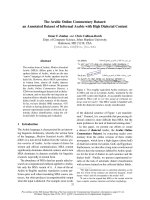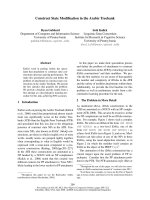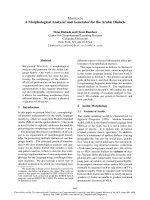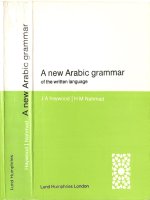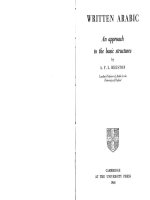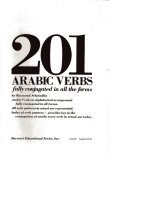the arabic idioms
Bạn đang xem bản rút gọn của tài liệu. Xem và tải ngay bản đầy đủ của tài liệu tại đây (590.04 KB, 27 trang )
The Art of Speech-Arabic Idioms Chapter
Arabic-English dictionary for idioms, proverbs, politeness expressions,
religious and Islamic expressions, slang and comparative spoken-written
Arabic vocabulary.
The Arabic Idioms
Written by Hussein Maxos
Arabic for non-natives series by Hussein Maxos©, Damascus 1995-2003.
;;;;;;;;;;;;;;
Index
• Introduction…………………………………………….page 3
• Symbols and abbreviations………………………………. 6
• Section
ا ﻒﻟﻷا فﺮﺣ……………………………………. 6
• Section
ب ﻟا فﺮﺣءﺎﺒ …………………………………… 17
• Section ءﺎﺘﻟا فﺮﺣ
ت …………………………………… 23
• Section ﻢﻴﺠﻟا فﺮﺣ
ج …………………………………… 24
• Section ءﺎﺤﻟا فﺮﺣ
ح …………………………………… 26
• Section ءﺎﺨﻟا فﺮﺣ
خ …………………………………… 29
• Section لاﺪﻟا فﺮﺣ
د ……………………………………. 31
• Section
ذ لاﺬﻟا فﺮﺣ……………………………………… 33
• Section ءاﺮﻟا فﺮﺣ
ر ……………………………………. 34
• Section ياﺰﻟا فﺮﺣ
ز ……………………………………. 37
• Section ﻦﻴﺴﻟا فﺮﺣ
س ………………………………… 38
• Section ﻦﻴﺸﻟا فﺮﺣ
ش ………………………………… 44
• Section دﺎﺼﻟا فﺮﺣ
ص ………………………………… 44
• Section دﺎﻀﻟا فﺮﺣ
ض ……………………………….… 45
• Section ﻟا فﺮﺣ ءﺎﻄ
ط ………………………………….… 47
• Section ﻦﻴﻌﻟا فﺮﺣع …………………………………… 50
• Section ﻦﻴﻐﻟا فﺮﺣ
غ ………………………………….… 59
• Section ءﺎﻔﻟا فﺮﺣف ……………………………………. 60
• Section فﺎﻘﻟا فﺮﺣ
ق ……………………………………. 62
• Section فﺎﻜﻟا فﺮﺣ
ك …………………………………… 64
• Section مﻼﻟا فﺮﺣ
ل …………………………………… 68
• Section ﻢﻴﻤﻟا فﺮﺣ
م ……………………………………… 72
• Section نﻮﻨﻟا فﺮﺣ
ن …………………………………… 79
• Section ءﺎﻬﻟا فﺮﺣ
ـه …………………………………… 80
• Section واﻮﻟا فﺮﺣ
و …………………………………… 81
• Section ءﺎﻴﻟا فﺮﺣ ي ………………………………… …83
• References……………………………………………
2
Introduction
The introduction is given in questions and answers style. They include:
• What is the idiom?
• How were the idioms collected?
• Why were only the commons idioms
chosen?
• How were the idioms arranged and
classified?
• Why were both spoken and written
put together?
• How the idioms were explained?
• What kind of synonyms and why?
• What is the alternative-similar form?
• Why the literal translation?
• Several kinds of idioms and how?
• How to use this book
• How to recognize the idiom in a
conversation or a text
3
• What is an idiom?
An idiom is an artistic expression of the language. Usually, the individual meanings of its
components is different from its literal meaning. By contrast, ordinary language is logical or even
mathematical (he studied for five years,
تاﻮﻨﺳ ﺲﻤﺧ ةﺪﻤﻟ سرد). Idiomatic expressions are colorful,
dramatic, lively, closer to the way people really feel, and closer to the local culture.
• How the idioms were collected? (pearl diving)
Unlike Arabic proverbs, where there is an existing public interest, such as books, dictionaries and
lexicons, there were not ready-made sources available for collecting idioms. Therefore, it took
several years to collect thousands of idioms mainly from two sources. First, live sources such as
TV, radios programs and movies and directly from daily interaction. Secondly, written sources,
such as newspapers, magazines, novels and books.
Why were only the commons idioms chosen?
(unusual in Arabic!)
Naturally, the more common the expression is in Syria and the Arab world, the more useful it is,
particularly to a non-native reader. In contrast, the proverbs listed in lexicons, radio, TV
newspapers and magazines include a considerable number of archaic proverbs, because these
are commonly presented for educational purposes to Arabic native speakers who are already
familiar with common and local proverbs. To simplify the task of the non-native learner of Arabic,
only about sixteen hundred idioms were chosen (from several thousands). More idioms may be
added in future editions.
• How the idioms were arranged and classified?
Alphabetical order was chosen. As for the idioms that have more than one common form, they
were listed under different letters. The first word of the idiom normally determines in what section
the expression is located. Idiomatic expressions are thus looked up the same as any word is
looked up in a normal Arabic – English dictionary. The same conventions apply. ( The verb has to
be in past tense singular, the noun is extracted from any additions such as a preposition or a
definite article etc.) .
• Why were both spoken and written put together? (a first in Arabic!)
Since the majority of idioms are used interchangeably between both speaking and writing, it
makes sense to place them in the same section. However, to clarify, each type is marked as
written only, spoken only, literary etc. Generally, spoken Arabic uses idioms more often than
written, and therefore, sixty to seventy percent of the idioms are more commonly associated with
the spoken language. At the same time, within written Arabic itself, there are noticeable
differences in usage: news commentary and analysis, novels and society, arts and sports reports
tend to use more spoken idioms than news or scientific reports and religious writing. In short, the
more serious, theoretical, abstract and formal the writing is, the more formal the written language
becomes.
• How are the idioms laid out?
First and in the right (Arabic) column, there is the idiom in Arabic script, sometimes with its
synonyms, if any, and alternative or similar forms. In the middle is the literal word-for-word
4
translation in English. Finally, to the left is found the explanation in terms of the general meaning,
the best situation when the idiom is used, historical and cultural background interpretation and, if
it exists, the English equivalent idiom.
• Kinds of synonyms
Synonymous expression are meant to give the same or nearly the same meaning. In some
cases, the synonym is easier to understand, and in other cases, it is more common. Sometimes,
the same words can be used in a different order e.g.
لﻮﻐﺸﻣ ﻪﻟﺎﺑ-ﻪﻟﺎﺑ لﻮﻐﺸﻣ or the same words are
used in a slightly different form (e.g. verb instead of adjective)
ﻲﻟﺎﺑ ﻞﻐﺸﻧا or merely a different
preposition e.g.
ءاﺮﻀﻟاو ءاﺮﺴﻟﺎﺑ-ﻟاو ءاﺮﺴﻟا ﻲﻓ ءاﺮﻀ .
• What is the alternative-similar form?
Often, the same or similar expression is used in different parts of the Arab world. The differences
range from accent, an alternate or added letter (
ك ،ث ،ج ،ذ ،ق), or use with an alternate
preposition. This is due to the cultural, ethnic, environmental and dialectical complexities of the
region. In fact, a relatively minor variation in accent or spelling can make the expression look very
different to the learner. For example
ﻪﻤﻋ ﻦﺑا ﻻو ﻖﺤﻟا كﺪﺑ Syrian, ا ﺰﻳﺎﻋع ﻦﺑا ﻻو ﻖﺤﻟ ﻪﻣ Egyptian
and
ﻪﻤﻋ ﻦﺑا ﻻو ﻖﺤﻟا ﺪﻳﺮﺗ Bedouin.
• Why the literal translation?
The advantages of literal translation are numerous. First, it increases vocabulary by allowing a
learner to make a direct word for word translation and comparison. Second, it highlights the
contrast between the direct (original) meaning of the expression and the indirect (idiomatic)
sense. Third, it opens doors to the moral values and way of thinking of native-speakers. It helps
to underline cultural factors: what the people consider persuasive, funny or sacred.
Caution: In some cases, a word for word rendering of the Arabic into English is impossible,
usually because the words simply do not exist in English.
• Several kinds of idioms
There are regular idioms and there are special idioms in terms of structure or meaning. Those of
special structure are the
dialogue expressions, the narrative expressions and the
rhetorical questions.
Dialogue expressions
Very common in Arabic, these typically require a formulaic response to a question, for example.
Two roles are required, e.g.
ﻪﻤﻋ ﻦﺑا ﻻو ﻖﺤﻟا كﺪﺑ؟ The listener should reply saying ﻖﺤﻟا or ًﺎ ﻌ ﺒ ﻃ
ﻖﺤﻟا
.
Narrative expressions
The narrative expression normally consists of two to four sentences that make a very short story
which makes a point, e.g.
ﻪﺒﻠﺣا لﻮﻘﻴﺑ رﻮﺗ لﻮﻘﺑ (I tell him it’s a bull, he says milk him!
This means he does not understand what I mean).
5
Rhetorical questions
The rhetorical question is a question form but requires no answer.
EXAMPLE
Offensive expressions
As in English and other languages, there are many expressions that are very useful and colorful
but which cannot be employed in polite company. In this book, a more acceptable, cleaned-up
version is offered in its place. The fact that a more salacious version is available is duly noted.
• How to use this book
First, it is recommended to read the book thoroughly and carefully, so one gets a good
understanding of what Arabic idioms are like. It also helps to know how the idioms are listed and
how to find them or return to them easily.
Idioms are useful for passive understanding
as well as active usage
.
Symbols and abbreviations:
The symbol Explanation Notes
“ “
Quotation mark used for direct meaning or
literal translation
=
synonym and alternative-similar form
Wr.
Written-classical Arabic
*
Antonym-opposite
<<
dialogue expression
Slang
Slang expression
@
body sign language
>>
Narrative expression
Sp.
Spoken Arabic
Lit
Kor
Eg
Gulf
Bed
rue
The ART OF SPEECH
IDIOMS CHAPTER
BY HUSSEIN MAXOS
6
The ART OF SPEECH
IDIOMS CHAPTER
BY HUSSEIN MAXOS
k ﻒﻟﻷا فﺮﺣ
Statistics Idioms: 174 Words:3314 Pages:10 Total number of idioms: 1579
•) ﷲا ءﺎﺸﻧإ( ﻲﻨﻌﻠﺒﺗو ضرﻷا ﻖﺸﻨﺗ
In a badly frustrating situation, you
perhaps wish to disappear from
existence!
•) ﺔﻤﻟز (ﺔﻴﺤﻟا سار ﻞآﺎﻴﺑ
A tough man, a real man.
•) ﻢﻋ (ﻨﺘﺳاﻰﺮﺒﺼﻟا غرﺎﻔﺑ
“TO BE WAITING WITH EMPTY
PATIENCE”
To be waiting impatiently or nervously
for someone or something.
“BE WAITING ON NEEDLES AND
PINS”
•) ﻦﻴﻠﺣ ﻚﻣاﺪﻗ( ﻦهﻼﺣأ/ﺎﻤهﻼﺣأﺮﻣ
When you have only two unpleasant
choices.
•) ﻞﺘﻣ ( ﺔﻓﺰﻟﺎﺑ شﺮﻃﻷا
“Like the deaf in the wedding”, means
having no idea about what is going on.
•) ﻦﻣ (اﺪﻳﻷ ﺪﻳ
“From hand to hand” too many people
use it.
•) ﺪﻗو (رﺬﻧا ﻦﻣ رﺬﻋا.
رﺬﻧأ ﻦﻣ رﺬﻋأ ﺪﻗو ،كرﺬﺤﺑ ﺎﻧأ.
“THE ONE WHO WARNS IS
EXCUSED”
A threatening or alarming expression like
saying “I am warning you, you will bear
the consequences.
• ﺎﻤﺴﻟا مﻮﺠﻧ ﻦﻣ ﺪﻌﺑا =بﺮﻗأ ﺎﻤﺴﻟا مﻮﺠﻧ
“FARTHER THAN THE STARS IN
THE SKY”
Used to describe something that is
absolutely impossible.
•ﺪﻳوﺎﺟأ ﻦﺑا .
“SON OF THE GOOD (PEOPLE)”
Highborn, A son of good, respectable
people”
ﺪﻳوﺎﺟأ is an uncommon plural of
ﺪﻴﺟ.
•ﻞﺻأ ﻦﺑا =ﻞﺻأ ﺖﻨﺑ
ﻞﺻأ ﻦﺑا ﺖﻧأ ﷲاو ،ﻲﻓو ﺎﻤﺋاد ﺖﻨآو ﺖﺑﺬآ ﺎﻣ اﺪﺑأ.
“SON (DAUGHTER) OF (GOOD)
ORIGIN”
Literally highborn, of noble birth and
used when you praise a faithful, honest
friend.
•ﻪﻣأ ﻦﺑا .
“SON OF HIS MOTHER”
7
The ART OF SPEECH
IDIOMS CHAPTER
BY HUSSEIN MAXOS
A good man is the one born and raised up
by a good mother. Used normally when
you praise someone’s bravery.
•مداوأ ﻦﺑا =ﺪﻳوﺎﺟأ ﻦﺑا
“SON OF ADAM (A HUMAN BEING)”
(same as “son of (good) origin”) above
Highborn, respectable person from a
good family.
•ﺪﻠﺑ ﻦﺑا .
ﺤﻣ ﺎﺸﻌﻟا ﻰﻠﻋ ﻚﻣﺰﻌﻳ حر ﺪﻴآأو ﺪﻠﺑ ﻦﺑا دﻮﻤ
مﻮﻨﻟاو
ﻩﺪﻨﻋ .
“SON OF (THE) COUNTRY/TOWN”
In Arabic it is very nice to say that
someone is loyal to his traditions and
origin. A generous man.
•سﻮﺒﺣ ﻦﺑا .
ﺔﻋﺮﺴﺑ ﻪﻴﻓ ﻖﺜﺗ ﻻ ، سﻮﺒﺣ ﻦﺑا ﻪﻧا ﻰﺴﻨﺗ ﻻ!
“SON (DAUGHTER) OF PRISONS”
Used to warn a friend when he deals with
someone who was in prison. Also used as
an insult.
•ماﺮﺣ ﻦﺑا .
“SON (DAUGHTER) OF
WRONGDOING”
A bastard.
•ﺐﺴﻧ و ﺐﺴﺣ ﻦﺑا .
“SON (DAUGHTER) OF LINEAGE
AND KINSHIP”
High bred or of noble birth. Someone
who comes from superior stock.
•ﺔﻣﻮﻜﺣ ﻦﺑا .
ﻪﺒﻠﻐﺗ رﺪﻘﺗ حر ﺎﻣ ﺔﻣﻮﻜﺣ ﻦﺑا اﺬه.
“SON (DAUGHTER) OF
GOVERNMENT”
A policeman or a high ranking official in
a state organization whom you have to
avoid being in trouble with.
•ﻪﺘﻋﺎﺳ ﻦﺑا .
“SON OF ITS (HIS) HOUR”
When used to describe an event, it means
it happened suddenly. When used to
describe someone, it means the person is
strange and unpredictable.
•ﺔﻌﻨﺻ ﻦﺑا .
ﺔﻌﻨﺻ ﻦﺑا ًﻼ ﻌ ﻓ ﻮه ،ﺔﻨﺳ ﻦﻴﻌﺑرأ ﻦﻣ رﺎﺠﻧ ﷲا ﺪﺒﻋ ﻮﺑأ.
“SON OF CRAFT”
A skillful craftsman, artisan or any
handicraft professional.
• سﺎﻧ و ﻢﻟﺎﻋ ﻦﺑا =لﻼﺣ ﻦﺑا ،ﻞﺻأ ﻦﺑا.
•ﺰﻋ ﻦﺑا .
نﺎﻤآ ﻊﺿاﻮﺘﻣ ﺲﺑ ،ﺰﻋ ﻦﺑا ﺢﻴﺤﺻ
“SON (DAUGHTER) OF POWER
(HIGH STANDING)”
A class expression which describes
someone who is (or was) from a
8
The ART OF SPEECH
IDIOMS CHAPTER
BY HUSSEIN MAXOS
powerful, wealthy family who is
generous and helpful.
•حرﺎﺒﻣ ﻦﺑا .
حرﺎﺒﻣ ﻦﺑا ادﺎه ،ﻪﻠﺸﻓ بﺮﻐﺘﺴﻣ ﻲﻧﺎﻣ ﺎﻧأ.
“SON OF YESTERDAY”
“Brand-new, fresh, inexperienced”
Someone whose ability or competence to
handle a certain situation you do not trust.
Used also by the older generation to
describe a younger, inexperienced person.
Eng: “BORN YESTERDAY”
•سراﺪﻣ ﻦﺑا =سراﺪﻣ ﺖﻨﺑ
ﺖﻴﺒﻟا ﺐﺗﺮﺗو ﺦﺒﻄﺗ فﺮﻌﺘﺑ ﺎﻣ سراﺪﻣ ﺖﻨﺑ يﺎه ،ًﺎﻌﺒﻃ
ﺎﻬﻣأ ﻞﺘﻣ.
“SON (DAUGHTER) OF SCHOOLS”
Used when an educated person behaves
in a strange or disappointing manner.
Used by common people to confirm that
schools do not teach everything and life
still the best teacher.
•يرﺪﺻ ﺞﻠﺛأ .
يرﺪﺻ ﺖﺠﻠﺛأ ﻩﺬه ةرﺎﺴﻟا كرﺎﺒﺧأ.
“COOL MY BREAST (CHEST)”
To give relief or comfort or bring hoped-
for good news. Formal.
•ﻲﻟﺎﺑ ﻰﻠﻋ ﺎﺟأ
"IT CAME TO MY MIND"
To feel like (drinking, eating something
or going somewhere ) You want to do it
but no decision has been made yet.
•ﻚﺒﻴﺼﻧ ﺎﺟأ
"YOUR CHANCE HAS COME"
This is your fate, luck or opportunity.
• ﻪﺘﻗو ﺎﺟأ ،ﻪﺘﻗﻮﺑ ﺎﺟأ
(It, he ) Just came on time.
•ﻲﺳﺮآ ﺮﺟا =ﺮآ ﻞِﺟرﻲﺳ
“LEG OF (THE) CHAIR”
A front man or someone who has less
importance or power than his position
would suggest. An empty suit.
•ماﺪﻘﻟ ﺮﺟا و ارﻮﻟ ﺮﺟا
ماﺪﻘﻟ ﺮﺟاو ارﻮﻟ ﺮﺟإ ﻲﺷﺎﻣ ،ددﺮﺘﻣ ﺖﻨآ ،ﺔﺣاﺮﺼﺑ
“You make hesitant steps” when you are
hesitant or confused concerning what to
say or what to do in your way heading for
some people or a place.
•ﺔﻘﻠﻔﻟﺎﺑ كﺮﺟا و يﺮﺟا .
ﻲﻧدﺪﻬﺗ ﻻ !ﺔﻘﻠﻔﻟﺎﺑ كﺮﺟا و يﺮﺟا
“MY LEG AND YOUR LEG IN (ARE
BOTH RECEIVING) BASTINADO”.
“We both share the responsibility (for this
mistake or the trouble) so don’t think you
can escape”. Bastinado is a traditional
(and painful) punishment which involves
being beaten on the soles of the feet.
9
The ART OF SPEECH
IDIOMS CHAPTER
BY HUSSEIN MAXOS
•جﻮﺟﺄﻣ و جﻮﺟﺁ
جﻮﺟﺁ ﻚﻴﻨه سﺎﻨﻟا ،مﻮﻴﻟا ضﺮﻌﻤﻟا ﻰﻠﻋ ﻲﺣوﺮﺗﻻ
جﻮﺟﺎﻣو.
When you complain that there are too
many people coming to the place, also a
crowded place. (Quranic expression)
•ﻚﺑﺎﺟ ﷲاو ﺖﻴﺟا .
ﺎﻧﺪﻋﺎﺳ لﺎﻌﺗ ،ﻚﺑﺎﺟ ﷲاو ﺖﻴﺟ ،ًﻼﻬﺳو ًﻼ ه أ.
“YOU CAME AND GOD BROUGHT
YOU”
You just came at the right time, just when
you were needed. It’s a cheerful
expression used to describe a situation
when you are in trouble and a friend who
can help you appears unexpectedly.
•ﻚﻨﻣ خﺁ
“AAH, (FROM) YOU!”
“Oh god! What have you done?” oh, you
again. A joking complaint.
•ﻪﻟﺎﺑ ﺪﺧأ =ﻚﻟﺎﺑ ﺮﻳد
“TAKE MIND (ATTENTION)”
To take care, be careful or pay attention.
EG
“TURN MIND (ATTENTION”
To take care, be careful or pay attention.
SYR
•ﻩﺪﻴﺑ ﺪﺧأ .
“TAKE BY THE HAND”
To give a hand, ensure support or help.
•ﻪﺣور ﺪﺧأ .
“TAKE HIS (HER) SOUL”, To kill, take
someone’s life.
•ﻪﻠﻘﻋ ﺪﺧﺁ
اﻪﻣاﺪﻗ ﻮه و رﺎﻬﻧ ﻞﻴﻟ ،ﻪﻠﻘﻋ ﺪﺧﺁ ﺮﺗﻮﻴﺒﻤﻜﻟ.
“TAKE ONE’S MIND”
To be obsessed by a hobby or some
activity.
•ﻩﺮﻃﺎﺧ ﻰﻠﻋ ﺪﺧأ .
ﺎهﺮﻃﺎﺧ ﻰﻠﻋ تﺪﺧأ ﻚﻟﺬﻟ ﺢﺿاو ﺪﻘﻧ ﻪﻴﻓ ﺎﻬﻌﻣ ﻚﻣﻼآ
“TAKE ON ONE’S MIND (HEART)”
To be or become offended. To have one’s
feelings hurt.
• ﺪﺧأ ﻠﻋﻪﻴ
“TAKE ON HIM (HER/IT)”
To criticize.
•ﻰﻨﻌﻣ ﺎﻬﻟ ﺪﺧأ .
“TAKE TO (FOR) IT A MEANING”
To misinterpret or misunderstand.
Usually a hint or word that can have a
double or negative meaning.
• ﺪﺧأ ﺲﻔﻧ.
“TAKE A BREATH”
To regain energy, take a break or have a
chance to recover from a tiring period or
stage.
10
The ART OF SPEECH
IDIOMS CHAPTER
BY HUSSEIN MAXOS
•ﺎﻄﻋ و ﺪﺧأ .
ﻪﻨﻣ ﻦّﻳﺪﺗ ،ﺶﻴﻠﻌﻣ !ﺎﻄﻋ و ﺪﺧأ ةﺎﻴﺤﻟا ﻚﻴه.
“GIVE AND TAKE”
This means discussion, exchanging views
and arguing. It can also mean to borrow
and lend or buy and sell. And also to be
flexible or sociable in company.
•دﻮﻘﻨﻌﻟا ﺮﺧﺁ .
دﻮﻘﻨﻌﻟا ﺮﺧﺁ ﻪﻣأ ﺐﻴﺒﺣ ﺪﻤﺤﻣ
“THE LATEST BUNCH (OF
GRAPES)”
An endearment expression for the
younger child in the Arab family who
traditionally receives more attention and
care than the rest of his/her older brothers
and sisters.
•نﺎﻣز ﺮﺧﺁ .
ﻒﻳﺎﺷ !نﺎﻣز ﺮﺧﺁ بﺎﺒﺷ
“THE END OF TIME” This shows
dissatisfaction, regret or criticism
concerning a strange trend, product or
behavior with which traditions do not
agree.
• ﺔﻋﺮﺻ ﺮﺧﺁ =ﺔﺤﻴﺻ ﺮﺧﺁ
“LATEST FAD”
(same as “latest cry”)
Most recent style or trend.
•ﺔﺤﻴﺻ ﺮﺧﺁ .
)لا اﺬه ،لﺎه (ءﺎﻳزﻷا ﻢﻟﺎﻌﺑ ﺔﺤﻴﺻ ﺮﺧﺁ ﺖﻴآﺎﺠﻟا
“THE LATEST CRY”
Used when you are proud of or impressed
by a specific fashion or style and you
want to say it is the latest trend.
•ﻲﻣدﺁ
(LIKE) ADAM
A person who has a good reputation.
•ﺺﺧﺮﻴﺑ ﻲﺷ ﻞآ ﻲﻟﺎﻐﻟا حوﺮﻴﺑ اذإ
(IF THE PRECIOUS GOES,
EVERTHING IS CHEAPENED" When
you justify being careless after losing
something dear or precious.
•ﻦﻴﻃﺎﻴﺸﻟا ﺖﺑﺮه ﺔﻜﺋﻼﻤﻟا تﺮﻀﺣ اذإ
؟ﻦﻴﻃﺎﻴﺸﻟا ﺖﺑﺮه ﺔﻜﺋﻼﻤﻟا ﺖﺟإ اذإ ﻲﻨﻌﻳ ؟ﺔﺤﻳار ﺶﻴﻟ
"WHEN ANGELS COME, DEVILS
RUN AWAY" A funny expression used
when someone on the way out meets
someone else coming in. (mythical
origin)
•ﺐﻴﺼﻧ رﺎﺻ اذإ
'IF IT IS FATED"
If it happens, if it ever happens, if gods
will or if it is (his, her, its ) fate to.
•را ﻪﻧﺎﺴﻟ ﻂﺒﺗ
“HIS TONGUE WAS TIED”
To be tongue-tied, speechless, stunned.
11
The ART OF SPEECH
IDIOMS CHAPTER
BY HUSSEIN MAXOS
•ﻞﺠﻔﻟا ﻦﻣ ﺺﺧرا
“CHEAPER THAN THE RADISH” It is
very cheap or cheaper than you think.
•ﻪﻄﻴﺣ ﻰﻃﻮﺘﺳا
“HIS WALL/FENCE IS
CONSIDERED LOW” He is an easy
mark or a victim. (Historically, thieves
preferred houses of easy fences and low
walls) Joke or real.
•فوﺮﺨﻟﺎه ىﻮﺘﺳا =فورﺎﺨﻟا ىﻮﺘﺳا ﺎﻣ
"IS THE SHEEP COOKED?'
When you complain that, someone went
to make something to drink or to eat and
he is slow or late.
• ﻚﻴﻟاﻮﺣ و ﻚﻟﻮﺣ ﷲا ﻢﺳا
- ﺔﻴﺗﺎﺒﺳﺎﻨﻣﻒﻄﻟ
•ﺎهﺎﻳ ﻚﻟ ﺖﻴﻬﺘﺷا
"I DESIRED IT FOR YOU"
Eng: "I wish you had been there" Said
when you enjoyed something and wanted
another person to share it.
•ﺎﻨﻌﻣ نﻮﻜﺗ كﺎﻨﻴﻬﺘﺷأ
"WE WISH YOU WERE HERE".
• ﺮﻴﺨﺑ ﻚﻬﺟو فﻮﺷأ
I (HOPE TO) SEE YOUR FACE WELL"
ﻲﺗﺎﺒﺳﺎﻨﻣ-ﻒﻄﻟ
•ﻦﻬﻀﻌﺑ ﻞﺘﻣ ﻮﻣ ﺪﻳﻷا ﻊﺑﺎﺻأ
'THE FINGERS OF YOUR HAND ARE
NOT THE SAME"
An expression used to say that people
from the same family, tribe, town or
country are not the same, so you should
not generalize.
•ّﺮ ﻔ ﺻ ا ّﺮ ﻀ ﺧ ا و .
“HE (SHE) TURNED YELLOW AND
GREEN”
When someone’s color changes, he/she is
deeply moved, shocked or scared.
•ةدرﺎﺑ ﻚﺑﺎﺼﻋأ .
ةدرﺎﺑ بﺎﺼﻋﺄﺑ ﻪﺗرﻮﻄﺧ ﻢﻏر ﻒﻗﻮﻤﻟا ﻪﺟاو.
“(YOUR) NERVES ARE COLD”
A person with a “cold nerves” is a cold
person. This can be both praise and
insult.
•ﻪﻨﻴﻌﺑ رﻮﻋا رﻮﻋا = رﻮﻋأ رﻮﻋﻸﻟ لﻮﻘﻴﺑ
ﺰﻜﻨﻴﻌﺑ
"HE CALLS THE ONE-EYED MAN
ONE-EYED"
A straight-speaking person who gives his
honest opinion without regard to tact.
"HE CALLS A SPADE A SPADE"
12
The ART OF SPEECH
IDIOMS CHAPTER
BY HUSSEIN MAXOS
•ﻪﻨﻣ حﺎﺗراو سﺮﻀﻟا ﻊﻠﻗا
“PULL OUT THE TOOTH AND
RELAX (FROM) IT.”
“To pull out the (bad) tooth and relax”
means to take off your pain (the source of
trouble) thoroughly and immediately.
“GET IT OVER WITH”
•ﺐﻠﻘﻟا ﻰﻠﻋ ﻢﻬﻟا ﻦﻣ ﺮﺘآا
"MORE THE CONCERN ON THE
HEART"
"Don't worry; that's the least of your
worries. You can't worry about
everything.
• ﺔﻣاﺪﻧ ﻪﻌﺑﺎﺻا ﻞآﺁ =ﺔﻣاﺪﻧ ﻪﻌﺑﺎﺻأ ّﺾ ﻋ
"HE ATE HIS FINGERS OUT OR
REGRET" "He was deeply sorry.
•ﺎهارو ﻪﻌﺑﺎﺻا ﻞآأ
ﺎهارو ﺎﻨﻌﺑﺎﺻأ ﺎﻨﻠآأ ،ﺔﻠآأ ﺎﻬﻣأ ﺎﻨﻟ ﺖﺨﺒﻃ.
"HE ATE HIS FINGERS AFTER IT"
When you lick your fingers after a meal,
it shows it was very delicious and tasty.
•يرﺎﺼﻤﻟا ﻞآأ
"HE ATE THE MONEY"
When you deny your debt or refuse to
pay back or give back.
"HE STIFFED US"
•ةوﻼﺣ ﻪﻠﻘﻌﺑ ﻞآأ .
ةوﻼﺣ ﻲﻠﻘﻌﺑ ﻲﻠآﺎﺗ ﻲﻟوﺎﺤﺗ ﻻ !ﻖﻓاو حر ﺎﻣ.
"HE ATE SWEETS IN HIS MIND"
To be tempted by someone's
persuasiveness.
•قوزﺎﺧ ﻞآأ
"HE ATE THE SHAFT"
The "khazouk" was an Ottoman way
of executing a man by making him sit
on a sharp stake (the shaft). Said when
you are stuck in a bad situation, get
cheated or suffer a big loss. (informal)
"HE GOT SCREWED"
• ﻲﺳار ﻞآأ =ﻲﻬﺟو ﻞآأ
"HE ATE MY HEAD" "HE ATE
MY FACE"
He was overly insistent.
•ﺔﻠﺘﻗ ﻞآأ !
"HE ATE A BEATING"
To be beaten up or physically hurt.
"HE TOOK A BEATING"
•ﻢه ﻞآأ
"HE ATE WORRY"
To be worried or deeply concerned.
• اﻮه ﻞآأ =وزﺎﺧ ﻞآأق
"HE ATE AIR" "HE ATE THE
SHAFT"
13
The ART OF SPEECH
IDIOMS CHAPTER
BY HUSSEIN MAXOS
Said when one takes a loss or
suffers a humiliation.
•ﻲﻬﺟو ﻞآأ
(He is) terribly insisting person. Also
when you receive criticism or blame from
people.
•ﻪﻨﻴﻌﺑ ﺎﻬﻠآأ .
"HE ATE IT WITH HIS EYES"
If someone or something fascinates you,
you keep staring at it, and then people
would notice and use this expression to
wake you up.
"HE COULDN'T TAKE HIS EYES OFF
IT (HER)."
•ﺔﻠﻴﻀﻓ ﺐﻧﺬﻟﺎﺑ فاﺮﺘﻋﻻا
“ADMITTING A SIN IS A
VIRTUE”
ﻞﺜﻣ
•ﺎﻴﻧﺪﻟا مأ مﺎﺸﻟا .
ا ،مﺎﺸﻟﺎﺑ ﻲﺷ ﻞآ ﻲﻗﻼﺘﺑ ًﺎ ﻌ ﺒ ﻃﺎﻴﻧﺪﻟا مأ مﺎﺸﻟ.
“DAMASCUS IS THE MOTHER OF
THE WORLD”
“Damascus is the best place in the world”
if you are in Damascus or Syria you
might hear this. Egyptians have their own
expression though.”
ﺎﻴﻧﺪﻟا مأ ﺮﺼﻣ“.
•ﺐﻳﺪﻠﻟ ﻻو ﻚﻟا <<
دﻮﻤﺤﻣ ! ﺐﻳﺪﻠﻟ ّﻻ و ﻚﻟا -ﺐﻳﺪﻟا ﺎﺴﺧ
ةﺮﻴﻟ ﺔﻴﻣ ﺲﻤﺧ ﻲﻨﻣزﻻ
“FOR YOU OR FOR THE WOLF?”
A warmly provocative expression used
when one asks a friend to do you a favor,
something you really need, If this friend
responds positively, he should answer:
.
ﺴﺧﺎﺐﻳﺪﻟا
“WOE TO THE WOLF”
This shows they are willing to help.
•ﻚﻗﺪﺼﻴﺑ ﻚﻌﻤﺴﻴﺑ ﻲﻠﻟا = ﻚﻣﻼآ ﻊﻤﺳأ
بﺮﻐﺘﺳأ كرﻮﻣأ فﻮﺷأ ،ﻚﻗﺪﺻأ/ﺐﺠﻌﺘﺳأ
"THE ONE WHO LISTENS TO YOU
BELIEVES YOU.
When someone mentions a matter in a
way you don’t like, you try to deny it, its
accuracy or to show false.
•ﻠﻟا تﺎﻣ تﺎﻓ ﻲ
WHAT IS GONE S DEAD”
The past is the past, Said it when you
change your mind concerning a previous
agreement or when a new set of rules
have been put into effect.
14
The ART OF SPEECH
IDIOMS CHAPTER
BY HUSSEIN MAXOS
•ﻨﻃ ﻪﻟا ﺔﻧرو ﺔ
"IT HAS ITS NOISE AND RINGING"
Attractive, popular or important
(someone or something).
•ﻤﻠآ ﻪﻟا ﺔ = ﺔﻠﻳﺎﻃ ﻩﺪﻳا
“HE HAS A WORD”
Used to describe someone who is listened
to and taken seriously. A powerful person
with good connections.
•ةﺮﻈﻧ ﻪﻟا
"HE HAS A POINT (VIEW).
The experienced man has good
perspectives, go and ask him when you
need to.
•ﻚﺑﺎﺼﻋأ ﻚﺴﻣا
'TAKE HOLD OF YOUR NERVES"
Cool down, calm down or take it easy.
"GET A GRIP"
•ﺔﻨﺠﻟﺎﺑ ﺲﻴﻠﺑإ ﻞﻣأ .
“HOPE OF THE DEVIL IN
HEAVEN”
It is impossible, no way! Never think
about it, it will never happen, or you
will never get it.
“NOT A SNOWBALL’S CHANCE IN
HELL”
• ناوﻷا نﺁ
ﻣ فوﺮﻈﻟا ،ﺎﻨﺘآﺮﺷ ﻊّﺳﻮﻧ ناوﻷا نﺁﺒﺳﺎﻨﺔ.
"THE TIME HAS COME"
It is time to. It is the best time to.
• إﺎﻬﻟﺎﺣ ﺖﻘﺷ ن
مﺎﻳا ةﺮﺸﻋ ﺖﻘﺷ ناو مﺎﻳا ﺔﻴﻧﺎﻤﺗ ﻚﻴﻨه ّﻞ ﺿ حر.
"IF SHE SPLIT HERSELF"
Said to express the worst case scenario
that could happen. It can't be any worse
than this. It can't go beyond this limit.
•ﻪﻧﺎﺴﻟ ىﺮﺒﻧا
“HIS TONGUE (WAS) WORN OUT”
“I (he) told you a hundred times”
•ﻚﻴه ﻦﻣ ﺮﺒآا ﺖﻧأ
“YOU ARE BIGGER THAN THIS”
You are saying this just because you are
mad, you will not do it. Used when your
friend is blaming you for saying,
planning or doing anything bad.
•ﻩﺮﻴﻜﻔﺗ ﻞﺸﻧا
"HIS THINKING WAS PARALYSED"
To become unable to think because of
being shocked, perplexed or exhausted.
"HE FROZE. HE CHOKED"
•ﻪﻨﻴﻋ ﻰﻠﻋ بﺮﻀﻧا .
“HE (SHE) WAS BEATEN ON HIS
(HER) EYE”
Used to ask someone “How could you
15
The ART OF SPEECH
IDIOMS CHAPTER
BY HUSSEIN MAXOS
have possibly done this? An offensive
expression used when you strongly blame
someone.
•ﻲﺒﻠﻗ ﻰﻠﻋ ﻰﻤﻌﻧا
"IT WAS BLINDED ON MY HEART"
“To be blind-hearted”, means to be
unaware of.
•ﻲﺒﻠﻗ ﻊﻄﻘﻧا
"MY HEART STOPPED"
You use it when you are scared or panic-
stricken.
"MY HEART FROZE"
•ﺔﻳﻵا ﺖﺒﻠﻘﻧا .
“THE (QURANIC) VERSE WAS
TURNED AROUND”
“The situation is now reversed” When
two persons or two groups exchange their
positions in a stage of some event.
•ﻩﺮﻃﺎﺧ ﺮﺴﻜﻧا
"HIS WISH (EXPECTATION) WAS
BROKEN"
To be emotionally hurt, offended or very
disappointed.
•ﻲﺑﺎﺼﻋأ تﺪﻬﻧا =ﺖﻔﻠﺗ/ﻲﺑﺎﺼﻋأ ﺖﻜﻠه
"MY NERVES WERE DESTROYED"
To be exhausted after nervous or difficult
situation.
•ﺖﻴﺒﻟا ﻞهأ .
ﺖﻗو يﺄﺑ ﺎﻧروﺰﺗ ﻦﻜﻤﻣ ،ﺖﻴﺒﻟا ﻞهأ ﻦﻣ ﺖﻧأ.
“PEOPLE (FAMILY) (OWNERS) OF
THE HOUSE”
Said to welcome someone to the house.
A typically hospitable expression used
for saying: you are not a stranger!
•لوﺄﺑ لوأ
“FIRST WITH THE FIRST”
One by one, piece by piece or gradually.
•ماﺪﻗ ﻦﻣ ﺪﻳأ و ارو ﻦﻣ ﺪﻳأ
ﻦﻣ ﺪﻳاو ارو ﻦﻣ ﺪﻳا ﺢﻳار ﻮهو ﻪﻠهأ روﺰﻳ ﺪﺣاﻮﻟا ﺐﻴﻋ
ﻞﻳﻮﻃ بﺎﻴﻏ ﺪﻌﺑ ماﺪﻗ .
"A HAND BEHIND AND A HAND IN
FRONT"
“Empty handed” how disappointing when
somebody doesn’t bring with him what
you expected him to!
•ﻖﻔﺼﺘﺑ ﺎﻣ ﺎهﺪﺣو ﺪﻳأ
“ONE HAND DOES NOT CLAP”
One hand can not do much. Unity is
needed for stronger action.
• لﻮﻄﺗ ﺎﻣو كﺪﻳأ =ّﻠ ﺑﺮﺤﺒﻟا ﻂ
"YOUR HAND AND WHAT IT CAN
REACH"
“Do whatever you can, you will not be
able to hurt me”
16
The ART OF SPEECH
IDIOMS CHAPTER
BY HUSSEIN MAXOS
• اﺔﻔﻴﻔﺧ ﻩﺪﻳ
"HIS HEAND IS LIGHT"
A skilled man. A thief.
•ﻠﻳﺎﻃ ﻩﺪﻳأ ﺔ
“HIS (HER) HAND IS STRETCHED
OUT”
A person with “an extended hand” is
powerful person, someone with influence
and connections.
•ﺔﻠﻳﻮﻃ ﻩﺪﻳا
(HIS (HER) HAND {ARM) IS LONG
Used to describe a thief or crook.
• ﺔﺒﺿﺎﻓ ﻩﺪﻳأ =ماﺪﻗ ﻦﻣ ﺪﻳاو ارو ﻦﻣ ﺪﻳأ
“HIS HAND IS EMPTY”
“A HAND IN FRONT AND A HAND
BEHIND”
????
“CAME EMPTY HANDED”
•ﻜﺳﺎﻣ ﻩﺪﻳأ ﺔ
“HIS HAND IS (TIGHTLY CLOSED”
Closefisted. a polite way for saying
stingy. Not hospitable and not generous.
•ﻣ ﻩﺪﻳأ مﺪﻟﺎﺑ ﺔﺨﻄﻠ.
“HIS HAND IS STAINED WITH
BLOOD”
Used to describe a murderer or guilty
person.
•كرﺎﻧﺰﺑ يﺪﻳأ
“MY HAND IN YOUR BELT”
I beg you, I appeal to you, please.
• كﺪﻳأ و يﺪﻳأ
“HAND WITH HAND"” together.
"HAND IN HAND"
•ﻞﻘﻌﻟا ﺪﺧﺎﻴﺑ =ﻦﻨﺠﻴﺑ
“IT TAKES THE MIND!”
“IT MAKES CRAZY”
Astonishing, amazing or wonderful.
•ﻦﻴﻤﻳ ﻲﺠﺘﺑ لﺎﻤﺷ ﺎﻬﺑﺮﻀﻴﺑ .
ﻲﺠﺘﺑ لﺎﻤﺷ ﺎﻬﺑﺮﻀﻴﺑ ،ظﻮﻈﺤﻣ ﻮه ﺎﻣ ﺪﻤﺣأ ﻦﻴﻜﺴﻣ
ﻦﻴﻤﻳ
“HE (SHE) BEATS IN (ON) THE
RIGHT AND IT COMES (FROM) THE
LEFT”
Used to describe an unlucky person who's
trying hopelessly and you want to cheer
them up by saying: hey! Life’s
opportunities can be very elusive.
•ﻪﺟو ﺪﺧأ .
ﺎﻨﻌﻣ حﺰﻤﻳو ﻲﻜﺤﻳ رﺎﺻو ﻪﺟو ﺪﺧأ ةرﺎﻳز ﺖﻟﺎﺗ ﺪﻌﺑ.
“TAKE FACE”
To be familiar or overly familiar with.
Used to describe social relations where
one allows himself the liberty of acting
informally. Has a negative sense of
someone overstepping social boundaries.
17
The ART OF SPEECH
IDIOMS CHAPTER
BY HUSSEIN MAXOS
•بﺮﻀﻟا و ﻩﺪﻳأ
“HIS HAND AND THE BEATING”
Used to describe a violent and harsh
person who likes to fight. Can be used
seriously or jokingly.
● لﻼﺣ ﻦﺑا.
“SON (DAUGHTER) OF
RIGHTEOUSNESS”
A good, helpful, generous person.
18
The ART OF SPEECH
IDIOMS CHAPTER
BY HUSSEIN MAXOS
• ﺪﺟ ﻦﻋ ًﺎ ﺑ أ
"FATHER FROM GRANDFATHER"
Inherited or deeply rooted in the family.
"IN THE BLOOD"
• ﺎّﻨّﻤﻃ ﻰﻘﺑا
"KEEP REASSURING US"
Then keep us informed. Used when
someone is leaving and you want him to
stay in touch.
• ﻟا ﻦﻣ ﻞﻘﺗأﻬّﻢﺐﻠﻘﻟا ﻰﻠﻋ
"HEAVIER THAN THE WORRY ON
THE HEART"
Boring or annoying.
• ﻪﻟﺎﺑ ﻰﻠﻋ ﺎﺟا =ﻲﻟﺎﺑ ﻰﻠﻋ يﺎﺟ
"IT CAME ON HIS (MY) MIND"
To occur, comes to one’s mind or
remember. To feel like or fancy
something.
"IT OCCURRED TO ME"
• ﻚﻄﺸﻤﻧ ﻦﻴﻨﻣ عﺮﻗأ ﺎﻳ ﺎﻧﺮﺘﺣا
“WE WERE CONFUSED O BOLD
ONE WHERE TO COMB YOU". You
are bold”, means it is hard to understand
you or make you happy.
• ﻚﻟ ﻦﺴﺣأ
"IT IS BEST FOR YOU"
It is better for you (warning or advice)
• ﺎﻣ ﻦﺴﺣأ =ﻚﻟ ﻦﺴﺣأ
"IT IS BEST TO"
• ﻞﺑﺎﻨﻟﺎﺑ ﻞﺑﺎﺤﻟا ﻂﻠﺘﺧا
"THE BOWMEN AND THE NOBLES
GOT MIXED UP"
“When fighters (archers or bowmen) mix
and leave their positions in the battle” it
is a total mess.
• ﻲﻌﺿاﻮﺗ ﺖﻠﺠﺧأ
"YOU EMBARRASSED MY
MODESTY"
To be embarrassed because some one’s
praise.
• ﻩﺪﺠﻣ ﺬﺧأ
"HE TOOK HIS GLORY"
To enjoy a good time.
• ندا)نذا/ناد ( ﻦﻴﺠﻋ ﻦﻣ نداو ﻦﻴﻃ ﻦﻣ
"AN EAR OF CLAY AND AN EAR OF
DOUGH"
To be indifferent, not listen or care.
• ﻪﻟاﻮﻣ ﻪﻨﻄﺑ ﻪﻟا ﻮﻣ ﻞآﻷا اذإ
"IF THE FOOD IS NOT HIS, HIS
STOMACH IS NOT HIS?"
“How can he/you eat like this” used to
criticize someone when eating too much,
19
The ART OF SPEECH
IDIOMS CHAPTER
BY HUSSEIN MAXOS
too fast or without manners.
• ﻲﺿار ﻲﺿﺎﻘﻟا اذإ!
"IF THE JUDGE IS SATISFIED"
“Keep away please” used to push aside
an intruder, or when you don’t want to
interfere or get involved.
• لﺎﻣو ﺎﻨﻟﺎﻣ ﻲﺿار ﻮهو ﻲﺿار ﺎﻧا اذا
ﻲﺿﺎﻘﻟا
ﻲﺿار ﻲﺿﺎﻘﻟا اذإ
• ﺔﻗﺮﻣ ﺎﻨﻌﺒﺷ ﺺﻴﻌﺟ ﺎﻨﺧﺎﺒﻃ اذإ
"IF OUR COOK IS (NAMED) JAEES,
WE'LL GET A LOT OF SOUP"
An expression used to criticize the one
who prepares food in a poor way. Said in
jest.
• ﻋ ،تﻮﻤﺘﺑ ﻲﺗﻮﻣ ﺎﻬﻟ ﺖﻠﻗ اذإ ﺶﻴﻌﺘﺑ ﻲﺸﻴ
"IF I TELL HER TO DIES, SHE DIES;
IF I TELL HER TO LIVE, SHE LIVES"
This expression indicates total faith and
obedience to someone. e.g.My young
son did everything I wanted him to do
without arguing when he was young.
• مﺪﻨﺗ ﻚﺘﻴﻠﺧ ﺎﻣ اذإ)ﻮﻜﺑ ﺎﻣن (
" IF I DID NOT MAKE YOU REGRET"
You will regret it. A threat.
"I'LL GET YOU FOR THIS"
• ﻪﺒﺣﺎﺻ ﻩﺪﺑ ﺎﻣ حﺮﻄﻣ رﺎﻤﺤﻟا ﻂﺑرا
“KEEP THE DONKEY WHERE HIS
OWNER WANTS". Don't bother giving
your advice if it is not appreciated.
• لُذ ٍم ﻮ ﻗ ﺰﻳﺰﻋ اﻮﻤﺣرا
"BE MERCIFUL WITH AN
HONORABLE PERSON WHO HAS
BEEN HUMBLED"
Please help me. I am not a beggar.
• ﺔﻌﺳاو ﷲا ضرأ
"GOD'S LAND IS VAST"
The world is so big and I can go
anywhere. Used when one can not live or
stay in a certain place anymore, and he is
hopeful to find another place. E.G a
divorced woman or A fired worker.
• نﺎﻀﺣﻷﺎﺑ ﻪﻠﺒﻘﺘﺳا
"THEY RECEIVED HIM WITH A
HUG"
To be received warmly.
• لﺎﻄﺑﻷا لﺎﺒﻘﺘﺳا ﻩﻮﻠﺒﻘﺘﺳا
"THEY RECEIVED HIM WITH A
HERO'S WELCOME"
To be received like a hero.
20
The ART OF SPEECH
IDIOMS CHAPTER
BY HUSSEIN MAXOS
• ﺔﻌﻤﺴﻟﺎه ﻰﻠﻋ اﻮﻌﻤﺳا!
"LISTEN TO THIS!"
“listen to this” sarcastic expression used
to show disapproval and surprise.
• ناﻮﻟأ لﺎﻜﺷأ
"SHAPES AND COLORS"
Many kinds. A variety of.
• ًﺎ ﻴ ﻠ ﻣ قﺮﻃأ
"HE HIT (HIS MIND) FULLY"
To think deeply. Wr.
• ُﻩ ﺪ ﻋ ﺎ ﺳ ﱠﺪ ﺘ ﺷ ا ﻢﻠﻓ ٍم ﻮ ﻳ ﻞآ ﺔﻳﺎﻣﺮﻟا ﻪﻤﻠﻋا
ﻲﻧﺎﻣر
“I TAUGHT HOM HOW TO SHOOT,
BUT AFTER HE LEARNED, HE
SHOT ME” used when you help some
until he’s capable, then he turns
against you. This expression
encourages loyalty.
• ﻪﺒآرا ﻚﻠﻴﺨﺑ ﺎﻣ ﻰﻠﻋأ = ﺮﺤﺒﻟا ﻂّﻠﺑ
"RIDE THE BIGGEST HORSES YOU
HAVE"
A threat from an opponent t\that you
don’t fear.
"DO YOUR WORST"
• ﻪﻤﺠﻧ ﻞﻓأ *ﻪﻤﺠﻧ ﻊﻄﺳ
"HIS STAR FADED"
Said when one’s fame or reputation fades
away. To not longer be popular. Wr.
• ﺔﻠﻴﻟ لوأ ﻦﻣ ﻂﻘﻟا سار ﻊﻄﻗا
“CUT THE CAT'S HEAD ON THE
WEDDING NIGHT", means you
should prove your manhood from the
beginning”. Used when diuscussing a
problem between a man and his wife.
Used to criticize somneon for being too
soft or lenient. Real or sarcastic.
• ﻦﻬﻴﻓ ﺪﺣاو ﻞﻗأ
"THE LEAST ONE OF THEM"
“The weakest one” means a group that
one has to take seriously. (They are so
strong that even the weakest of them is to
be feared.
• رﺎﻐﻟا ﻞﻴﻟﺎآأ = رﺎﻐﻟﺎﺑ ﻞّﻠﻜﻣ
"CROWN OF GARLAND
Symbol of glory. The Garland (plant)
crown used in medeaval time to celebrate
a hero often returning from victorious
war.
• ﺮﻀﺧﻷا ﻞآأﺲﺑﺎﻴﻟاو
"HE ATE THE GREEN AND THE
DRY"
To wipe out totally. To be greedy and
21
The ART OF SPEECH
IDIOMS CHAPTER
BY HUSSEIN MAXOS
merciless.
22
The ART OF SPEECH
IDIOMS CHAPTER
BY HUSSEIN MAXOS
• ﺔﺑﺮﺿ ﻞآأ
"HE ATE (TOOK) A HIT"
"To take or receive a hit (physical
metaphorical).
• ﻢه ﻞآأ
"HE ATE THE CONCERN"
To be worried or deeply concerned.
• اﻮه ﻞآأ
"HE ATE AIR"
To be screwed up, or suffer big loss or
failure. It is the soft version of an
expression that uses a bad word.
• ﺖﻗو ﻞآأ
"IT ATE TIME"
To take or consume time.
• ﻢﻈﻋ ﻲﻧﺎﻣرو ﻢﺤﻟ ﻲﻨﻠآأ
"HE ATE MY FLSEH AND THREW
AWAY MY BONES"
This expression is used when somebody
is abandoned or discharged after many
years of service or being together.
• ﺎﻬﻠآأ =اﻮه ﻞآأ
"HE ATE IT (AIR)"
• ﺔﻤﻠآ ﻰﻘﻟأ
"HE GAVE A WORD"
To give a speech.
• ﻲهﺎﻨﻟا ﺮﻣﻵا
"THE COMMANDER AND THE
FORBIDDER"
The only who can decide (in this matter).
• ﺎﻨﺤﻧو ﻞﺼﻓ ﺖﻧاﻣ ﺲﺒﻠﻨ
"YOU SEW AND WE'LL WEAR IT"
I’ll do whatever you want. You decide.
• ﻲﺴﻔﻧ تﺪﺴﻧا
"MY SOUL WAS BLOCKED"
Used when you lose appetite after hearing
bad news or when a problem arises.
• ﻲﻟﺎﺑ ﻞﻐﺸﻧا =لﻮﻐﺸﻣ ﻲﻟﺎﺑ
"MY MIND WAS OCCUPIED" "MY
MIND WAS BUSY"
To be worried or deeply concerned.
• ءاﻮﻟ ﺖﺤﺗ ىﻮﻀﻧا
"HE SAT IN THE SHADOW OF THE
FLAG"
To join a group, philosophy or a certain
movement. Wr.
• ﻲﻠﻋ ﺢﺘﻔﻧا
"IT WAS OPENED ON ME"
To receive unexpectedly strong reaction,
usually followed by an argument.
"THEY LET ME HAVE IT"
• ﻞﺒﺴﻟا ﻪﺑ ﺖﻌﻄﻘﻧا
"THE ROADS WERE CUT"
To be stranded. Wr.
23
The ART OF SPEECH
IDIOMS CHAPTER
BY HUSSEIN MAXOS
• ﺮﺣﺎﺴﻟا ﻰﻠﻋ ﺮﺤﺴﻟا ﺐﻠﻘﻧا
“HIS MAGIC HAS TURNED AGAINST
HIM”, His evil is being used against him.
"HE DUG HIS OWN GRAVE"
• ةدوﺪﻌﻣ ﻪﻣﺎﻳأ
“HIS DAYS ARE NUMBERED” It will
be finished, dead, or ruined soon.
• ﻚﺳار ﻰﻠﻋ يﺪﻳا
"MY HAND ON YOUR HEAD"
ﻦﻴﻤﻳ Used when someone begs someone
to tell him the truth.
• ﻲﺒﻠﻗ ﻰﻠﻋ يﺪﻳا
"MY HAND IS ON MY HEART"
When “you put your hand on your heart”
it means you are confused, anxious and
insecure, specially when waiting for or
doing something without a clue about the
results.
24
The ART OF SPEECH
IDIOMS CHAPTER
BY HUSSEIN MAXOS
• ﻲﻠﺟر و يﺪﻳا)ﻲﺷ(
"MY HAND AND MY LEG"
Something that is “my hand and my leg”
is what I cannot do without, such as
skilful assistant or good equipment.
"MY RIGHT HAND"
• رﻮﺘﺳد ﻻو ﻢﺣا ﻻ
"NO AHEM OR PERMISSION"
“Without permission”. ﻢﺣا is originally
used when a visitor wants to enter a
house or another part of the house in
case the family is doing something or
women want to put their Hijab in front
of a stranger.
رﻮﺘﺳد and ﷲﺎﻳ are used
for the same situation.
• ﻻ ﷲا)نﺎآ (ﻼﻐﻟا بﺎﺟ
"GOD (HOPEFULLY) DID NOT
BRING HIGH PRICES"
You are as unwelcome as raising the
prices. A joke and funny expression when
a friend or someone comes.
• نﺎﺴﻧﻻا ﻖﻠﺨﻳ ﷲا/ ﻪﻌﻣ ﻪﻗزرو ﻩﺪﺒﻋ
ﻲﻣﻼﺳا
• ﺔﺒﻴﻄﻟا رﺎﺒﺧﻷا ﺎﻨﻌّﻤﺴﻳ ﷲا
"MAY GOD LET US HEAR GOOD
NEWS"
“What news!-did you really do this?”
used when some embarrassing news or
secrets are revealed.
• ﻚﻳﺪﻳا ﺮﺴﻜﻳ ﷲا
"MAY GOD BREAK YOUR HANDS"
“It is terrible what you have done” used
to criticize or blame some one for
awkward or stupid way of doing some
thing.
• ةﺪﻴﻌﺴﺑ ﺪﻴﻌﺳ ﻲﻨﻬﻳ ﷲا
"MAY GOD MAKE SAEED HAPPY
WITH SAEEDA"
Those two (friends, relatives or husband
and wife) are good or suitable to each
other. Used when wishing a couple a
good luck or in sarcasm.
• حور ﺎﻳ ﻚﻟﻮﻃ ﻢﻬﻠﻟا =بﻮﻳأ ﺮﺒﺻ ﺎﻳ
"MAY GOD GIVE MY SOUL
PATIENCE" = "I NEED THE
PATIENCE OF JOB"
A complaint used when you are about to
be fed up.
25
